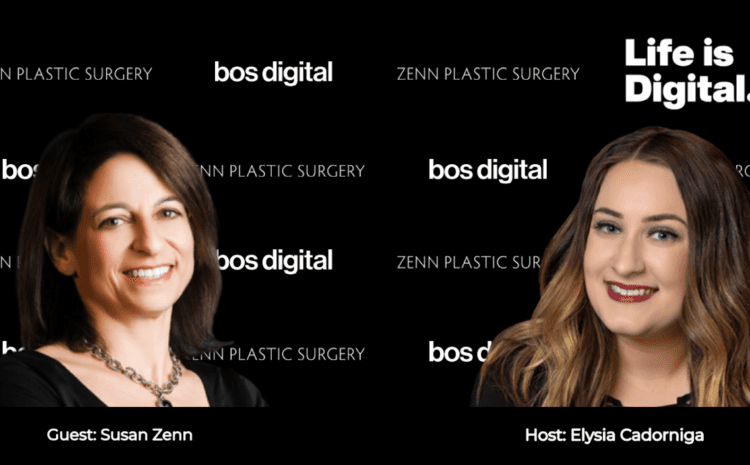Building a High-Impact, Recognizable Brand Through Effective Online Storytelling
Elysia: Everybody, welcome to Life is Digital™ this week. I’m your host, Elysia Cadorniga. Get ready to learn about digital marketing as we share our knowledge and perspectives on the current trends, best practices, and actionable tips to help you grow your business in the digital age. I’m really excited about this week’s episode. We have Susan Zenn, Marketing Director of Zenn Plastic Surgery, on board with us today. Susan, I’m so glad to have you on.
Susan: I am so excited to be here. Thank you for asking me.
Elysia: I know we have such good conversations about marketing all the time, so why not have an episode. Right, absolutely. Awesome! Well, maybe it makes sense before we get started; you want to introduce yourself a little bit.
Susan: Sure, so my name is Susan Zenn, and my husband Michael Zenn is a plastic surgeon in the Raleigh Durham market. He’s been a plastic surgeon for 25 years, and he spent most of his career in academic medicine at UNC and Duke. After about 20 years in academics, he decided he wanted to go into private practice. So, in 2017, he left Duke, he opens Zenn plastic surgery, and we have together built a really nice business. I have a background in marketing, so I jumped at the chance to promote the practice and we’re having a lot of fun doing it.
Elysia: Awesome!
With your background in marketing tell us what you’ve done in the past?
Susan: Sure, I have always had an interest in advertising and marketing, and when I was young and had young children, I actually lived in New York, and I was the vice president of an ad agency. I worked primarily in the media department, I negotiated network television time, but I’ve always had a real interest in marketing, and you know how things work.
Elysia: Yeah, yeah, no, it was cool to be able to do the content and having you walk through these different shots with us and getting ideas from you and being on the same wavelength with each other, which is kind of what we’re talking a little bit about today, right. It is a lot of fun. What’s really cool is every story is different, and a lot of guests that we have on are coming from just various different industries. You’re the first guest that we’ve had where you’re in the Plastic and Reconstructive Surgery industry.
In the plastic surgery industry are there any new developments?
Susan: Let me just give you a little background of our perspective because the industry has changed so much in the last two decades since doctors and started practicing. It used to be that plastic surgeons did eight or nine years of post-medical school training, and then they became reconstructive surgeons, and most of them did cosmetic surgery on the side. That’s not really how it is anymore. Now, these days, med students go right into plastic surgery training, and they can come out and become cosmetic surgeons, and a lot of them do. They kind of skip the whole reconstructive thing. I understand why. It’s a much better lifestyle. It’s more lucrative, and they can be their own boss. There are definitely benefits to it. What it’s done is it’s created this really competitive marketplace in the world of cosmetic surgery. In the old days, we would never advertise a doctor’s practice that was taboo, it was looked down on, and these days you really can’t play if you don’t advertise in some fashion. Social media and digital media is really where it’s at. Magazines are not working the way they used to. TV and radio really are not great for plastic and reconstructive surgeons or cosmetic surgeons, so social media is great. You can show before and after photos. You can show what’s going on in the office, you can get your potential patients to get to know what you want with an online presence, and you really have to be there these days to be competitive.
Elysia: Yeah, yeah, I know, I think about myself, just as I scroll through online, whether I’m on Instagram or on Facebook, and a lot of times I find myself thinking about myself scrolling through, I’m like, what’s intriguing me, what do I look at, and so on… I think one of the number one things about this industry is it’s all about the credibility and the perception of just how credible you are and that you’re telling that effectively and being able to communicate that message. I think a lot of times I mean, we’ve talked about this, if you don’t have that presence on social anymore, even if somebody referred you, they’re still gonna go online and validate that if it doesn’t match, and what they hear about you does match what they see me, I completely abort a sales process, when that happens to me and I don’t have that resource of online to tell me and make me feel comfortable about my decision.
Susan: Exactly, exactly. So, you have to be there. It’s not a choice anymore. It’s a necessity.
When thinking of the quote “a plastic surgeon is only as good as his or her online presence,” what comes to mind?
Susan: Well, it’s sort of like you just said, it used to be the medical referrals came from either a doctor, another doctor or a personal friend that had experience with that plastic surgeon in this case, and while those channels still exist, as you said, everyone goes to the internet so even if you’re a friend or a doctor gives you the name of a really good plastic surgeon, you’re still gonna check him or her out online, that’s just the way it is. So, we all know the doctors aren’t necessarily the best marketers, let’s say. So, we all have hired marketing companies. Every plastic surgeon I know in the country has a marketing company, website, and social media company. These advertising marketing companies are creating and controlling the online presence of the plastic surgeon just. It’s amazing that we have marketing people using words like internationally renowned or award-winning, double board-certified, and they’re throwing these terms around, and I can tell you half of them are nonsense. They are adjectives that are just being attached to plastic surgeons because it makes them look good, and that’s the marketing that is, they’re only as good as the people behind them, and that’s really sad if you think about it, but that is the reality.
Elysia: Well, that’s such a good point because how do you think for Zenn. I’m thinking about your brand and your company as a whole, how do you overcome the jargon, like the typical cliche jargon of it. What are you guys doing differently?
Susan: Well, we’re actually really lucky because we have the real deal. We can stand by and say Dr. Zen has traveled the world teaching his techniques to young plastic surgeons. That’s true. And you can back it up and you can find info about it on our website, so in a way, we’re really lucky because we’re all about, hey, this is who we are, we think we offer something really different and really special, and we’re just gonna be authentic and we hope you will choose to consider us. We don’t feel like we really have to compete. We just feel like we have to be out there and get our story out to as many people as possible…
Elysia: Right. I think your story really boils down to more of an emotional connection that you have to showcase online. I think all the buzzwords, everyone hears them. I know doctor Zenn and knowing him now, it’s the credibility that comes with him. It’s almost just for you guys, it’s an expectation, it’s a standard, so you probably spend more of your time communicating the impact that you guys have on your patients and the true, just genuine care that you provide, because otherwise, how else are you supposed to hit that emotional reason of why someone’s gonna choose you over another world-renowned surgeon… Right, right. Yeah, it totally makes sense. I think a lot of times, that’s one of the biggest pieces that businesses miss is the emotional component, like getting past the surface of just your traditional marketing message, but really understanding what your patient for you guys is looking to and what they need to make that decision. They don’t know what to do.
Susan: Right, exactly. And I think that a lot of that credit in our case, goes to doctor Zenn. When he left Duke and decided he wanted to open a private practice, he knew exactly the kind of practice he wanted to run. He wanted a boutique practice not a factory. We don’t see 20 people a day. We spend quality time with our patients and consultations which are an hour long. We are a family. We get to know our patients on a really deep level and help them through this journey that is cosmetic or plastic surgery. Pre-op, you meet with the doctor and a nurse post-op, the day after your surgery, you meet directly with the doctor, it’s a very hands-on practice, and that’s how Dr. Zenn wanted his private practice to be. So, we just focus on educating people, what makes us different and why you should choose doctors, and if you stick to those two main themes, it works because it’s really authentic.
Elysia: Yeah, it makes your message pretty easy. Actually, that’s interesting about messaging, having an accurate, effective communication strategy. If it takes you too much effort to think about what you’re gonna say, right, are you really being genuine? I think you have to ask yourself that. Right.
Susan: Just very true to who we are, and it works. You don’t have all the energy spent trying to be something that you’re not… We aren’t for everybody. If you’re looking for the cheapest plastic surgeon in town, it’s not gonna be us, and we tell you that if you. There are certain procedures, doctor Zenn just doesn’t do. He knows what he plays to strength, and he can do all of them, he’s done them, and he’s taught them, but he’s chosen the ones that he really is good at and really wants to do. If you call and you’re looking for something he doesn’t do, we’ll refer you to someone in town which we know is good, but we just don’t try to be everything to everybody.
Elysia: Yeah, again, it goes back to just knowing who you are exactly as a brand, and I know you guys… You do not being from that, and you’ve been very expressive just on how you talk about a mind and it’s evident, it’s evident in your story, you see it online, it’s the amount of testimonials and reviews that we see your team generate, it speaks for itself. And I think what I’m curious in is you’ve got your brand story figured out, right, and now when you have your brand story, then you gotta start asking yourself. What types of content feed our brand story, what are some of the things you share online, and what do you? Maybe for you, Susan, what do you think, just off the top of your head.
What do you think is the most important message a company should share online?
Susan: Right, so it’s really important that we educate. We feel like our job is to educate the public because patients are making decisions. We want them to have as much information as possible when they’re making a decision as important as cosmetic surgery. So, a lot of our online presence is spent educating, explaining, explaining things like just because someone’s board-certified doesn’t mean their board certified in plastic surgery or did you know that you don’t have to be board certified in plastic surgery to call yourself a cosmetic surgeon? Real educational things. And then also Dr. Zenn loves to teach, he was the director of the plastic surgery residency for years, and he loves to teach. So a lot of our online presence is doctors and explaining why he does certain procedures certain ways, or what to expect post-operatively, or what’s the most common question, he gets in, we like it that we always say in our office, by the time you actually come in for your consultation, it’s like the third date, we’ve already met Dr. Zenn online, you thought you’ve already talked to our patient care coordinator. We want you to feel like by the time you come to our office, we know each other already, that’s that family feel that our office has, so it’s really important that we show that doctors in is an expert. We also find that some of our best interaction with social media, of course, is all the personal things. Dr. Zenn isn’t crazy about us posting personal things about him, but there’s no question that the people magazine effect is real, and people love to know where he’s going on vacation or what his kids are doing. And so that’s a piece of it because again, we want people to know who we are and to feel comfortable with us.
Elysia: Yeah, yeah. You’re humanizing that piece. Now, I know this is kind of a far stretch example, but honestly, I think about it a lot because it totally makes sense, but I have a three-year-old son, and he was actually born with two holes in his heart, and we were very grateful to be able to work with the Duke Hospital actually to have surgery done there, and we were granted that, and we were so blessed. What’s great is that no matter what the procedure is, with what you guys do versus what was happening there. There’s risk involved, always and there’s a natural fear to train big life changes like that, and what put me at ease was the recognition obviously with Duke, but what really put me at ease as the stories that I’ve heard from the surgeons and what they’ve done. Just the level of care and attention that I had and just how they communicated with me and how they really thoroughly took me step by step through the process and didn’t treat me just like an incoming patient. Move them through the process, but yeah. In any type of procedure like… You’re transforming people’s lives. That’s not selling a product, right off the shelf. It’s bigger than that.
Susan: I was going to say, you know, plastic surgery is really unique, it’s one of the few fields in medicine where you’re not dealing with sick people… Right, right. So, you try all these years to be a doctor, and you’re dealing with people who are not only perfectly healthy, but just want to make changes to their body. We all know how valuable that can be. Still, it’s just really interesting because we have a healthy patient population and the other thing about plastic surgery that’s so unique, it’s really an art form, if you have a doctor take out your appendix, well, you’re not going to know what it looks like versus another doctor. Still, if you have a plastic surgeon do a breast augmentation or a facelift or have your eyes done, it depends on who your doctor is. You are going to see the results. No, two results are gonna be the same because it’s really an art form, so it is a very unique field, and that’s why it’s important that you really know who you’re trusting your body with, or two.
Elysia: Yeah, no, absolutely. I think that’s very well said. Which kind of goes into where my thought process now is, is you’ve been… You guys have been in business for… Is it three years? Three years and a half? Yes. Okay, you’ve set up a solid foundational more. Obviously, we can see it, and you’re continuing to invest in that because that’s important to continue to grow. You’ve built a strong reputation.
What do the next couple of years hold for Zenn Plastic Surgery?
Susan: It’s funny. Dr. Zenn always jokes. His goal is never to have to put a cent into advertising, he wants it all word of mouth, and I keep telling him, Oh, that’s not that… That’s not gonna happen. We’re going to keep on keeping on. We’re just gonna constantly re-evaluate, which I do all the time. I’m going to ask questions of the professionals that I deal with, including you and your team, I like to challenge people, as you know, I like to ask questions and kind of approach things from different angles, and I guess I’m always looking for the next opportunity to spread our message.
Elysia: Yeah, yeah, no, I think that’s very well said. I like the in-depth, harder conversations because it breaks through the surface of what you’re really trying to accomplish, so I think it’s important to be willing to go there in any business setting to take things to the next level from your brand. So, I think that’s awesome. Very, very well said, yeah. You know, Susan, I just really appreciate you and taking the time to chat with me today. I love hearing about different industries, and I think it’s really… For those maybe that run businesses or in a similar field, it’s good for them. Are you trying to validate if what they’re doing or how they’re doing it is the right process? Right, and absolutely. I think my biggest takeaway, just from hearing you, is it really should be, if you have the right brand story, it should not be this uphill battle to share, and you have to be genuine in who you are. You can’t go in with this technical mumbo-jumbo message and education without also softening it with the personal reason of why you’re serving your patients, exactly, it’s a balance of both, and I appreciate you hopping on today
Susan: Oh my God, thank you again for inviting me. I could talk about this stuff all day long.
Elysia: I’d really enjoy talking about it with you offline, I think it’s where some of the best ideas get generated… Right. In these types of conversations. So, I’m excited about what you guys are doing, super excited about. You’re building your team as well, so you have Tara joining, and that’s super exciting on the med spa service side of things at… Yeah, we’ll just see where things take us, so I just really appreciate you joining today.
Susan: It’s been my pleasure. And thank you to you and your team. You’ve got a phenomenal team. I love working with Erica. She’s great and you guys do great work. I appreciate that
Elysia: I really do thank you so much and for the audience. We really appreciate you tuning in to this episode of life is digital again. I’m your host, Elysia Cadorniga. I was here today with Susan Zenn and the Marketing Director of Zenn Plastic Surgery and just remember to tune in, rate review and subscribe to this show and until next time, don’t stop












